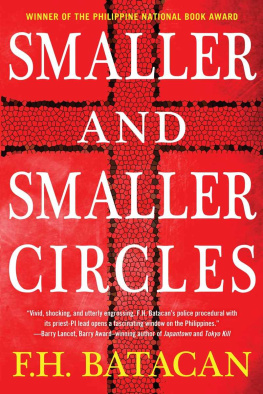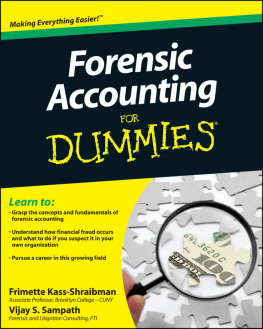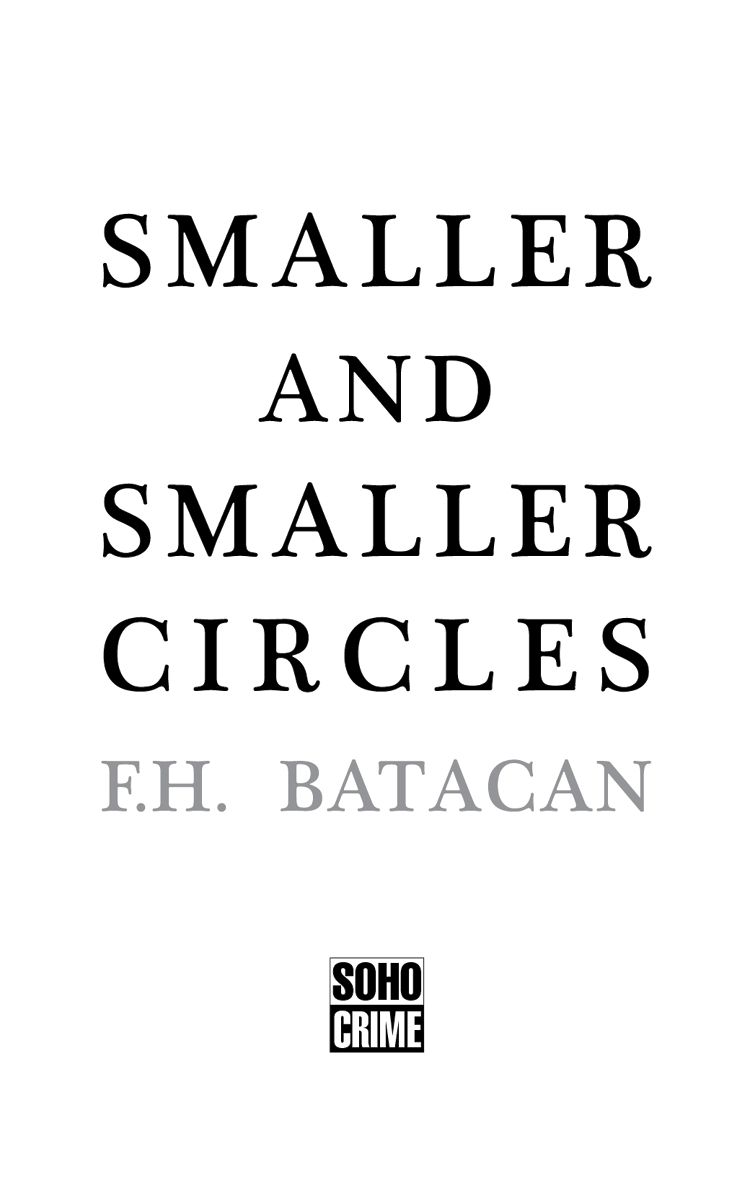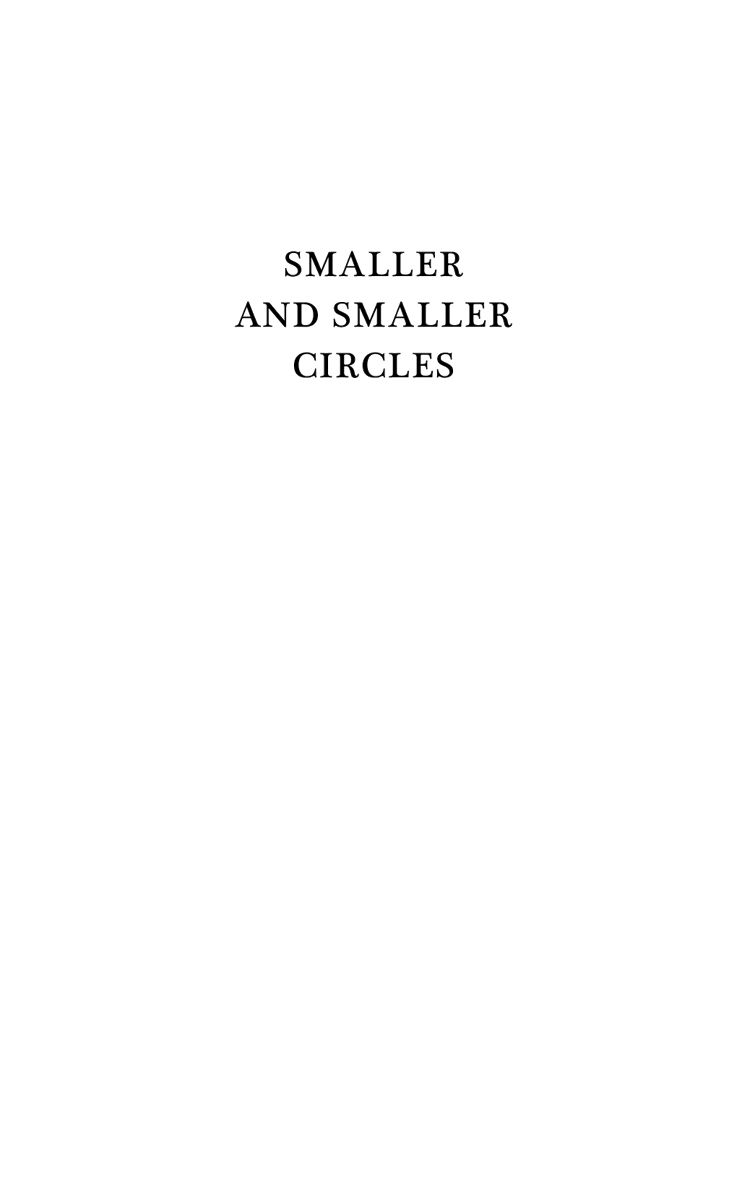Copyright 2015 by F.H. Batacan
Portions of this book were first published by the University of the
Philippines Press in novella form under the same title in 2002.
Published by
Soho Press, Inc.
853 Broadway
New York, NY 10003
Library of Congress Cataloging-in-Publication Data
Batacan, F.H.
Smaller and smaller circles / F.H. Batacan.
ISBN 978-1-61695-398-0
eISBN 978-1-61695-399-7
International PB ISBN: 978-1-61695-527-4
1. Teenage boysCrimes againstFiction. 2. Serial murder
investigationFiction. 3. PriestsFiction. 4. Forensic
anthropologistsFiction. 5. Catholic ChurchFiction. 6. Payatas
(Philippines)Fiction. 7. Quezon City (Philippines)Fiction. I. Title.
PR9550.9.B35S66 2015 823.92dc23
2015001668
Printed in the United States of America
10 9 8 7 6 5 4 3 2 1
To Tess and Frankie, for all that I am.
To Coke, for all that I cannot be.
To Jamie, for all that I will yet become.
A man who has depths in his shame meets his destiny and his delicate decisions upon paths which few ever reach, and with regard to the existence of which his nearest and most intimate friends may be ignorant; his mortal danger conceals itself from their eyes, and equally so his regained security. Such a hidden nature, which instinctively employs speech for silence and concealment, and is inexhaustible in evasion of communication, desires and insists that a mask of himself shall occupy his place in the hearts and heads of his friends; and supposing he does not desire it, his eyes will some day be opened to the fact that there is nevertheless a mask of him thereand that it is well to be so.
Friedrich Nietzsche
Some days I just cant seem to focus. Its hard to concentrate on whats going on around me, on what Im doing.
Its been getting worse lately. Sometimes I feel overwhelmed from the moment I wake up in the morning, as though something bad is going to happen. I cant breathe right; my hands and feet are cold. My head hurts.
I feel like everything I do from sunup to sundown is just to keep this bad thing from happening. And every day I have to do more and more. It is exhausting. Nothing that I do is ever enough.
I feel like Im always being watched.
I hate being watched.
Prologue
Emil is running after his slum kids, panting in the noonday sun, loosening the high collar of his shirt as he goes.
The children urge him on, their voices shrill with agitation.
Not much further, Father Emil!
Over here, this way!
Just a little more!
His fear grows with each step. It tastes like rust, feels gritty like dirt in his mouth.
The stench from the sea of garbage around them is overpowering. It rained last night, and now that the sun is out, the dump site is steaming. Awful vapors rising lazily with the heat: wet paper and rot and excrement mixing in a soup of odors around them, above them.
Youd think by now you would be used to this , he tells himself, but youre not. One never gets used to this.
At last they come to a small space about five feet in diameter, where the garbage has been cleared away to expose the older, compost-like layer beneath.
There. One of the children points.
Even before he looks in the direction indicated by the thin forefinger, he detects it, a new note of putrescence among all the putrescences mingling in the unwholesome air.
A small, thin, pale hand protrudes from beneath the garbage.
Mother of God, he mutters under his breath. He turns to the children. Quick, get me a long stick.
Three children immediately come forward, offering him the digging sticks they use to poke through the garbage. He takes one and walks grimly toward their discovery.
He is about to begin when a flash of concern for the children stabs through the grey, slow-moving haze of fear. He stops, turns around and tells them to leave.
No, Father Emil, they say, first one voice, then many voices. We will stay with you, and in their faces there is a kind of quiet determination and sympathy so grown-up it startles him.
Secretly he is glad of the company. He does not repeat the order and returns, face set, to the business at hand.
All right. Here we go then.
He begins to root through great clumps of garbage, and slowly the thing begins to emerge. He wont look at it yetalthough he already knows what it isnot until he has more or less cleared away the refuse above and around it.
When he is done, the body of a child emerges. It is a boy about eight to ten years old, though it is difficult for Emil to tell the age accurately. Even at fourteen or fifteen, most of these kids are small, very small, owing to malnutrition and disease.
It is lying face down in the muck and completely naked.
The smell of itnow the dominant note in the vile broth of rot smells; it hangs heavy and horrible in the air.
Flies like fat, shiny blue-black beads, buzzing around the body insistently.
Emil cannot see any marks or wounds on the back or on the back of the head. Afraid to touch the corpse, he slides one end of the stick underneath the body, just beneath the chest, and uses it as a lever to turn the body over. The deadweight almost breaks the stick in two.
The sudden silence among the children is odd. In fact, the whole world seems to Emil to have fallen silent. The neighborhood sounds and the sounds of the traffic from the highway have faded to a strange, low rumble in his ears.
The front of the childs body seems to be moving, and it takes the priest a few seconds to comprehend that there are maggots in it, thousands of them. Gaping woundsno, holesin the chest and stomach.
Emil realizes the heart has been removed, the child eviscerated. The genitals are missing.
He looks at the face. Please, God, let the face remind me this used to be a human being. Another few seconds and he realizes the face is gone, as though it has been scraped off, leaving a mess of jellied eyeball and bone protruding here and there through muscle.
Hard to make sense of what is missing, what is left.
Purple-brown scabs on the childs knees, probably from an afternoons rough play.
The spell abruptly broken now, the children running, screaming, from the clearing, leaping goatlike over the garbage in terror.
Emil turns, staggering away from the body, and throws up until his stomach feels completely empty. It does not seem enough; he still feels sick, and he forces his throat to constrict several times, to no avail.
Through the tears that stream from his eyes, he sees that three of the older children have remained. They come toward him now, wordlessly take him by the hand and lead him out quietly, gently, through the garbage.
It rained last night. Heavy rain from a blood-red sky, crashing down for hours without stopping.
I like the rain. Sunny days and their heat make me listless, sluggish, depressed. Isnt that strange? Shouldnt it be the other way around?
But when it rains I feel powerful.
The rain sends everyone running for cover. But while they scurry like rats for the nearest shelter, afraid of the wet and the thunder and the lightning, I come alive.
The rain makes it easier to do the things I have to do.
Horrible weather.
Gus Saenz looks up. Water is running in rivulets off Jeromes wet umbrella. Between the beating of the rain on the roof and the steady thump of the music blaring from the stereo component system, Saenz didnt hear the other man come into the room.











